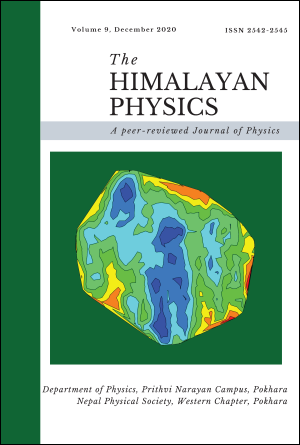Elliptically polarized laser assisted elastic electron-hydrogen atom collision and differential scattering cross-section
DOI:
https://doi.org/10.3126/hp.v9i01.40205Abstract
In the present study, we have investigated scattering of an electron by hydrogen atoms in the presence of the elliptical polarized laser field. We have discussed the polarization effect of laser field on hydrogen atom and effect of the resulted polarized potential on differential scattering cross-section is studied. We assume the scattered electrons having kinetic energy (~3000 eV) and laser field of moderate field strength because it is permitted to treat the scattering process in first Born approximation and the scattering electron was described by Volkov wave function. We found that the differential scattering cross-section area increases with the increase of the kinetic energy of the incident electron and there is no effect of changing the value of polarizing angle on the differential cross-section with kinetic energy. We observed that differential scattering cross-section in elliptical polarization in the high energy region depends upon the laser intensity and the incident energy for a linearly polarized field.
Downloads
Downloads
Published
How to Cite
Issue
Section
License

The articles published in the Himalayan Physics are distributed under a license CC BY-NC-SA 4.0.




